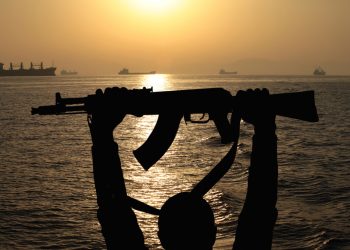The UN Security Council has renewed for another year its authorization for international naval forces to join in fighting piracy off the coast of Somalia, stressing that while the threat of such crime had declined, it still remained a matter of grave concern.
Unanimously adopting resolution 2316 (2016) and again affirming the primary responsibility of Somali authorities in the effort, the Security Council renewed the call upon States and regional organizations that were able to do so to cooperate with those authorities and each other in deploying naval vessels and military aircraft, by providing logistical support, and by seizing and disposing of boats, arms and related equipment reasonably suspected to be used in piracy and armed robbery in the area.
Acknowledging a steady decline in attacks since 2011, the Council commended the contributions of the European Union’s Naval Force (EUNAVFOR) Operation ATALANTA, the North Atlantic Treaty Organization’s (NATO) Operation Ocean Shield, the Combined Maritime Forces’ Combined Task Force 151, the African Union and the Southern Africa Development Community, as well as individual States for naval counter-piracy missions and protecting ships transiting through the region.
Noting with concern the continuing gap in domestic capacity and legal frameworks for the detention and prosecution of suspected pirates and those who profited from the crimes, the Council recognized the continued need for national legislative action and international capacity-building assistance in that regard.
In the preambular section of the text, the Security Council also expressed serious concern over reports of illegal, unreported and unregulated fishing in Somalia’s exclusive economic zone and, noting a complex relationship between such activity and piracy, recognized that it accounted for millions in lost revenue for the country and could contribute to destabilization of coastal communities.
The Council reaffirmed that the authorizations renewed in the resolution applied only with respect to the situation in Somalia and did not affect rights, obligations and responsibilities of Member States under international law, including the Convention on the Law of the Sea.
Following the adoption, Mohamed Rabi A. Yusuf, representative of Somalia, thanked the Security Council for its valuable support to his country in all areas, including addressing piracy, and asked for continued support from the international community. He noted the recognition of the Secretary-General’s report that a lack of economic opportunity in the country was one of the triggers of piracy.
Welcoming adoption and assuring the Council his Government’s full cooperation with its provisions, he expressed appreciation of the acknowledgement that illegal, unreported and unregulated fishing resulted in loss of revenue and could lead to destabilisation along the coast.
Source: UN Security Council





























































